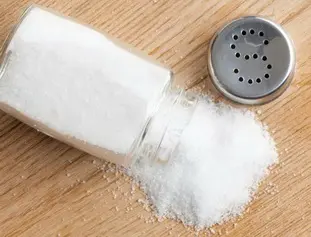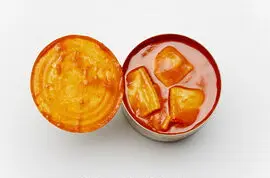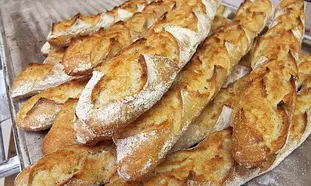This site uses only a few technical cookies necessary for its operation. By continuing to browse, you accept their use.
To find out more...
To find out more...
Let's go easy on the salt

In terms of cooking, I'm probably not teaching you much, salt is ubiquitous, we put it in almost all our dishes, in varying amounts depending on our taste, some like salty, others less, others still not. Its main role is the flavor, the taste, we say that it is a flavor enhancer, ie it reveals the tastes of food, especially if they are a bit bland by nature.
8,848 4.8/5 (19 reviews)
Keywords for this post:SaltHealthExcessWHOLimitationReductionLast modified on: February 20th 2021
Let's go easy on the salt
In other words, a dish that is not salty is much less tasty than a salty dish, and as a result, it is, for many (and I am the first), difficult to do without it.
But there are 2 salts, the one you add while cooking, or by spreading with semi-salted butter, according to your taste, and especially the one you don't see or don't feel, the hidden salt. And to illustrate this, I will take 2 concrete examples:
So when you heat up a simple box of ravioli, you will eat too much salt without realizing it, and as a recent study by "Que choisir" shows, it's even worse for anything that seems cheap, the less expensive the product is, the more salt it contains, so that the manufacturer can mask the poor quality of its ingredients.
But let's go back to salt, in France, the usual use (but it is not regulated, for the moment), is 18 gr of salt per kilo of flour. This is relatively little, to compare 50 years ago it was 24 gr, or even more!
The trend is clearly downwards, and the bakery industry is pushing for a reduction to 16 or 14 g, or even less.
Moreover, there is a simple phenomenon linked to slow bread-making: the longer the dough rests and ferments, the less salt it needs. And so the express baguettes from the supermarkets or bread factories, imagine what they load in salt to try to sell you something that has a vague taste.
Don't hesitate to ask your baker, ask him how much salt he uses per kilo of flour? If he's a good baker, not only will he give you a straight answer, but he'll also be able to give you his personal perspective on this delicate subject. By the way, our Belgian friends have a maximum of 14g.
Then, when we cook, we must try to avoid having a heavy hand in salt with extremely simple tricks too: always taste before re(salting), prefer spices to salt when possible, do not "double" that is to say for example do not salt a dressing, because it is already salty with the addition of mustard, no or little salt if you put cheese in your recipe, etc.
Nothing revolutionary in all this you will have understood, you just have to be a little careful, read carefully the labels of what you buy, and especially... cook as much as possible!
To sum up: Let's go easy on the salt, it's a matter of our health.

But there are 2 salts, the one you add while cooking, or by spreading with semi-salted butter, according to your taste, and especially the one you don't see or don't feel, the hidden salt. And to illustrate this, I will take 2 concrete examples:
Ready-made meals
The industrialists of the food industry have found in salt their best friend, not only they raise the taste as I told you previously, but moreover it acts as a water retainer, so everything that contains water, almost everything in fact, is generally very or too salty. Tragically, there is a lot of it everywhere, in all ready-made meals, cold cuts, snacks... even sweet foods (creams, desserts, biscuits, etc. etc.) contain it.
So when you heat up a simple box of ravioli, you will eat too much salt without realizing it, and as a recent study by "Que choisir" shows, it's even worse for anything that seems cheap, the less expensive the product is, the more salt it contains, so that the manufacturer can mask the poor quality of its ingredients.
Bread
In bread, there is also salt, bread is extremely simple: water, flour, a little salt and yeast or leaven, period! Everything else, as JP Coffe rightly said, is crap, just there to compensate for the deficiencies of industrial bread.
But let's go back to salt, in France, the usual use (but it is not regulated, for the moment), is 18 gr of salt per kilo of flour. This is relatively little, to compare 50 years ago it was 24 gr, or even more!
The trend is clearly downwards, and the bakery industry is pushing for a reduction to 16 or 14 g, or even less.
Moreover, there is a simple phenomenon linked to slow bread-making: the longer the dough rests and ferments, the less salt it needs. And so the express baguettes from the supermarkets or bread factories, imagine what they load in salt to try to sell you something that has a vague taste.
Don't hesitate to ask your baker, ask him how much salt he uses per kilo of flour? If he's a good baker, not only will he give you a straight answer, but he'll also be able to give you his personal perspective on this delicate subject. By the way, our Belgian friends have a maximum of 14g.
And so?
The observation is without appeal, we eat too much salt, we should be at 5 gr/day maximum according to the WHO, and we are rather at 10/15 gr in France.What can we do?
The solution is almost too simple: first of all, we must try to limit all ready-made products, which is often easier said than done. Let's see this as a strong signal to push us to cook more and more ourselves, by transforming the products we buy locally. The virtuous circle I've already told you a lot about (yes, it's my hobby): we buy local even if it's a bit more expensive, we support local producers, they produce well and healthily, it's good for our health, everyone wins.Then, when we cook, we must try to avoid having a heavy hand in salt with extremely simple tricks too: always taste before re(salting), prefer spices to salt when possible, do not "double" that is to say for example do not salt a dressing, because it is already salty with the addition of mustard, no or little salt if you put cheese in your recipe, etc.

Nothing revolutionary in all this you will have understood, you just have to be a little careful, read carefully the labels of what you buy, and especially... cook as much as possible!
To sum up: Let's go easy on the salt, it's a matter of our health.
Lasts posts
XO Cognac Explained: Meaning, Aging, and Flavor Profile
XO Cognac always goes beyond the labels on the bottle: it is often associated with tradition and quality. You get to appreciate the artistry, character and ageing process when you understand what defines this smooth Cognac. The section below tackles everything about XO Cognac, from complex flavour...January 28th 2026568 Sponsored article
Butter vs. grease
We often read in a recipe where a pastry is put into a mould that, just before pouring, the mould should be buttered or greased. But what's the difference between these 2 terms?December 1st 20252,4455
Getting out of the fridge early
Very often when you're cooking, you need to take food or preparations out of the fridge, to use them in the recipe in progress. There's nothing tricky about this: you just take them out of the fridge and use them, usually immediately, in the recipe. But is this really a good method?November 24th 20251,6125
Who's making the croissants?
When you look at a bakery from the outside, you naturally think that in the bakery, the bakers make the bread, and in the laboratory, the pastry chefs make the cakes. It's very often like that, with each of these professions having quite different ways of working, but sometimes there's also one...November 23th 20251,453
Oven height
When we put a dish or cake in the oven, we naturally tend to put it on the middle shelf, and that's what we usually do. But in some cases, this position and height can be a little tricky, so let's find out why.October 8th 20254,7145
Other pages you may also like
Maillard reactions
This subject cropped up recently in a discussion with my three charming nieces; do you know what Maillard reactions are? With a name like that, they could well be some principle in mechanics, but in fact the term applies to something much closer to all of us: it's what gives food more flavour...January 28th 201538 K4
The ideal restaurant
Like all passionate cooks (I suppose), from time to time I dream of opening my own restaurant. I imagine loads of things: it will be like this or like that, we'll do this, I'll cook that, the room will have this or that – in short, I dream.October 15th 201216 K4.4
How to zest a fruit?
You will have no doubt noticed that many recipes call for the zest of citrus fruit. The zest is that outer layer of the skin which adds so much flavour to a dish. There are many different ways to peel off the zest and various tools are available. Here is a summary of the “dos and don'ts” of...November 5th 201348 K3.8
Steam for baking bread
What does steam have to do with bread-making? This is not only a bakers' secret, it is something you might not think of at all: if you make bread and bake it like a cake, you will end up with bread, but pale and with a thick, hard crust – a long way from the golden-brown crusty loaf you had in...June 16th 2021148 K4.5
A few tips for effective kneading at home
When you have to knead dough for bread or some other recipe, you may well use a food processor or the type of machine known as a stand mixer. The best-known brands are Kenwood and KitchenAid. They are useful tools, but here are a few tips to help you get the best out of them.June 23th 2021285 K 23.8
Post a comment or question
Follow this page
If you are interested in this page, you can "follow" it, by entering your email address here. You will then receive a notification immediately each time the page is modified or a new comment is added. Please note that you will need to confirm this following.
Note: We'll never share your e-mail address with anyone else.
Alternatively: you can subscribe to the mailing list of cooling-ez.com , you will receive a e-mail for each new recipe published on the site.









